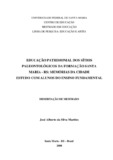| dc.creator | Martins, José Alberto da Silva | |
| dc.date.accessioned | 2008-06-18 | |
| dc.date.available | 2008-06-18 | |
| dc.date.issued | 2008-04-30 | |
| dc.identifier.citation | MARTINS, José Alberto da Silva. ESTATE EDUCATION OF THE PALEONTHOLOGIC SITES OF THE
FORMATION SANTA MARIA, RS STATE: THE CITY MEMORIES
STUDE BY STUDENTS OF FUNDAMENTAL SCHOOL. 2008. 109 f. Dissertação (Mestrado em Educação) - Universidade Federal de Santa Maria, Santa Maria, 2008. | por |
| dc.identifier.uri | http://repositorio.ufsm.br/handle/1/6821 | |
| dc.description.abstract | The present dissertation has been developed in the Line of Research Edutation and
Arts of the Post-Graduation Program in Education - PPGE. It is a qualitative research which
aimed to investigate, along with the City Chamber of Town Councillors, whose projects
approach questions on the fossil estate protection in town and, to do so, three city councillors
have been interviewed. The City Secretary of Education has been asked about the disciplines
and/or contents offered about this theme in the fundamental city schools. It was also intended
to research the City Historic Archive to look into the documents or reports that tell about the
first excavations or the first vestiges of any kind of fossils found in this city. The work of
elaborating the Educational Guide on the fossil signals was made at 'Antônio Alves Ramos -
Patronato' School by a group of eight students from the 6th grade of Fundamental School. The
data collect was made in 2007. The tools used were the participant observation, document
analysis, field diary and semi-structured interviews. The collected data were interpretated in
accordance with the elaborated categories, being discussed concerned to the theoretical
reference points that guide the investigation. In this study, it was concluded that the research
questions were answered according to the previewed ideas. Thus, actually, in Santa Maria -
RS, the question on the preservation of the fossil estate still needs much attention from the
governments and from the education institutions for a better cultural development. So, once
the teaching of Art and Estate Education might contribute to estimulate the feeling of caring
for the cultural aspects of the public estate, investigating the city memory, its value and what
it represents to the community. | eng |
| dc.description.sponsorship | Coordenação de Aperfeiçoamento de Pessoal de Nível Superior | |
| dc.format | application/pdf | por |
| dc.language | por | por |
| dc.publisher | Universidade Federal de Santa Maria | por |
| dc.rights | Acesso Aberto | por |
| dc.subject | Patrimônio | por |
| dc.subject | Memória da cidade | por |
| dc.subject | Vestígio fóssil | por |
| dc.subject | Estate | eng |
| dc.subject | City memory | eng |
| dc.subject | Fossil vestige | eng |
| dc.title | Educação patrimonial dos sítios paleontológicos da formação Santa Maria - RS: memórias da cidade estudo com alunos do ensino fundamental | por |
| dc.title.alternative | Estate education of the paleonthologic sites of the formation Santa Maria, RS state: the city memories stude by students of fundamental school | eng |
| dc.type | Dissertação | por |
| dc.description.resumo | A presente dissertação foi desenvolvida na Linha de Pesquisa Educação e Artes, do Programa de Pós-Graduação em Educação-PPGE. Trata-se de uma pesquisa de cunho
qualitativo que objetivou investigar, junto a Câmara Municipal de Vereadores, quais projetos abordam questões referentes à proteção do patrimônio fossilífero da cidade. Para tal,
entrevistou-se três vereadores. Entrevistou-se o Secretário Municipal de Educação, para abordar quais disciplinas e/ou conteúdos são ofertados relativos a essa temática nas escolas
municipais de Ensino Fundamental da cidade. Foi, também, pretensão do estudo, pesquisar no Arquivo Histórico Municipal documentos ou reportagens que relatem as primeiras escavações ou os primeiros indícios de algum tipo de vestígios fósseis encontrados neste município. O trabalho de elaboração do Guia Educacional dos vestígios fósseis foi confeccionado no Colégio Antônio Alves Ramos - bairro Patronato, com um grupo de oito alunos do 6º ano do
Ensino Fundamental. A coleta de dados foi realizada durante o ano de 2007. Os instrumentos usados foram a observação participante, análise documental, diário de campo e as entrevistas semi-estruturadas. Os dados coletados foram interpretados de acordo com as categorias elaboradas, sendo discutido com base nos referenciais teóricos que permearam a investigação. Neste estudo, concluiu-se que as questões da pesquisa foram respondidas conforme o previsto, pois, realmente, na cidade de Santa Maria RS, a questão da preservação do patrimônio fossilífero ainda carece de muita atenção do poder público e das instituições de
educação, para um melhor desenvolvimento cultural, sendo que o ensino da arte e da educação patrimonial pode contribuir para estimular o sentimento de pertencimento com
aspectos culturais do patrimônio, investigando a memória da cidade e o valor que tem em si e na representação para a comunidade. | por |
| dc.contributor.advisor1 | Corrêa, Ayrton Dutra | |
| dc.contributor.advisor1Lattes | http://buscatextual.cnpq.br/buscatextual/visualizacv.do?id=K4788025Y2 | por |
| dc.contributor.referee1 | Brites, Blanca Luz | |
| dc.contributor.referee1Lattes | http://buscatextual.cnpq.br/buscatextual/visualizacv.do?id=K4783359E0 | por |
| dc.contributor.referee2 | Oliveira, Valeska Maria Fortes de | |
| dc.contributor.referee2Lattes | http://buscatextual.cnpq.br/buscatextual/visualizacv.do?id=K4728785U2 | por |
| dc.creator.Lattes | http://buscatextual.cnpq.br/buscatextual/visualizacv.do?id=K4268027H1 | por |
| dc.publisher.country | BR | por |
| dc.publisher.department | Educação | por |
| dc.publisher.initials | UFSM | por |
| dc.publisher.program | Programa de Pós-Graduação em Educação | por |
| dc.subject.cnpq | CNPQ::CIENCIAS HUMANAS::EDUCACAO | por |


